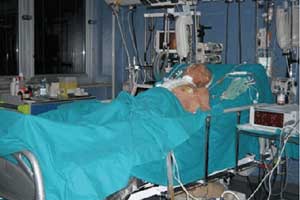- Home
- Editorial
- News
- Practice Guidelines
- Anesthesiology Guidelines
- Cancer Guidelines
- Cardiac Sciences Guidelines
- Critical Care Guidelines
- Dentistry Guidelines
- Dermatology Guidelines
- Diabetes and Endo Guidelines
- Diagnostics Guidelines
- ENT Guidelines
- Featured Practice Guidelines
- Gastroenterology Guidelines
- Geriatrics Guidelines
- Medicine Guidelines
- Nephrology Guidelines
- Neurosciences Guidelines
- Obs and Gynae Guidelines
- Ophthalmology Guidelines
- Orthopaedics Guidelines
- Paediatrics Guidelines
- Psychiatry Guidelines
- Pulmonology Guidelines
- Radiology Guidelines
- Surgery Guidelines
- Urology Guidelines
High Calorie nutrition does not increase survival in critical patients

The use of an energy-dense formulation for enteral delivery of nutrition in patients undergoing mechanical ventilation is not associated with a higher rate of survival at 90 days compared with the use of routine enteral nutrition, according to a new Australian study. Therefore increasing the calorie intake for an intensive care patient may not improve their chances of survival.
The findings of the study have been published in the New England Journal of Medicine.
Investigators conducted this multicenter, double-blind, randomized trial to test the premise that delivering a larger number of calories with the use of energy-dense enteral nutrition in patients receiving mechanical ventilation would result in higher rates of survival within 90 days vs routine care.
The study involved adults undergoing mechanical ventilation in 46 Australian and New Zealand intensive care units (ICUs) to assess energy-dense (1.5 kcal/mL) vs routine (1.0 kcal/mL) enteral nutrition at a dose of 1 mL/kg of ideal body weight per hour, commencing at or within 12 hours of the initiation of nutrition support and continuing for up to 28 days while the patient was in the ICU. The primary outcome was all-cause mortality within 90 days.
A total of 3,957 patients were included in the modified intention-to-treat analysis (1,971 in the 1.5-kcal group and 1,986 in the 1.0-kcal group).
Also Read: Mortality similar in early Enteral vs. Parenteral nutrition in ICUs
Key Findings:
- The volume of enteral nutrition delivered during the trial was comparable in the two groups.
- Patients in the 1.5-kcal group received a mean (± SD) of 1,863 ± 478 kcal per day vs 1,262 ± 313 kcal per day in the 1.0-kcal group (mean difference, 601 kcal per day; 95% CI: 576-626).
- An aggregate of 523 of 1948 patients (26.8%) in the 1.5-kcal group and 505 of 1966 patients (25.7%) in the 1.0-kcal group died (relative risk, 1.05; 95% CI: 0.94-1.16; P=0.41) by day 90.
- In seven predefined subgroups, the outcomes were comparable.
- Higher calorie delivery did not affect survival time, receipt of organ support, the number of days alive and out of the ICU and hospital or free of organ support, or the incidence of infective complications or adverse events.
They found that the rate of survival at 90 days related to the use of an energy-dense formulation for enteral delivery of nutrition was not higher vs routine enteral nutrition in those undergoing mechanical ventilation.
For further reference follow the link: 10.1056/NEJMoa1811687

Disclaimer: This site is primarily intended for healthcare professionals. Any content/information on this website does not replace the advice of medical and/or health professionals and should not be construed as medical/diagnostic advice/endorsement or prescription. Use of this site is subject to our terms of use, privacy policy, advertisement policy. © 2020 Minerva Medical Treatment Pvt Ltd